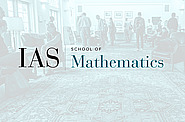Previous Special Year Seminar
Mar
10
2020
Theoretical Machine Learning Seminar
Your Brain on Energy-Based Models: Applying and Scaling EBMs to Problems of Interest to the Machine Learning Community Today
Will Grathwohl
12:00pm|Dilworth Room
Mar
05
2020
Theoretical Machine Learning Seminar
Understanding Deep Neural Networks: From Generalization to Interpretability
Gitta Kutyniok
12:00pm|Dilworth Room
Mar
03
2020
Theoretical Machine Learning Seminar
What Noisy Convex Quadratics Tell Us about Neural Net Training
12:00pm|White-Levy
Feb
27
2020
Theoretical Machine Learning Seminar
Preference Modeling with Context-Dependent Salient Features
12:00pm|Dilworth Room
Feb
25
2020
Theoretical Machine Learning Seminar
Learning from Multiple Biased Sources
Clayton Scott
12:00pm|Dilworth Room
Feb
20
2020
Theoretical Machine Learning Seminar
Geometric deep learning for functional protein design
Michael Bronstein
12:00pm|Dilworth Room
Feb
13
2020
Theoretical Machine Learning Seminar
The Lottery Ticket Hypothesis: On Sparse, Trainable Neural Networks
Jonathan Frankle
12:00pm|Dilworth Room
Feb
11
2020
Theoretical Machine Learning Seminar
Geometric Insights into the convergence of Non-linear TD Learning
12:00pm|Dilworth Room
Feb
06
2020
PCTS Seminar Series: Deep Learning for Physics
Topic #1: Understanding Machine Learning via Exactly Solvable Statistical Physics Models; Topic #2: Dynamics of Generalization in Overparameterized Neural Networks
Speaker #1: Lenka Zdeborova; Speaker #2: Andrew Saxe
11:45am|Jadwin Hall, PCTS Seminar Room 407, 4th Floor
Feb
04
2020
Theoretical Machine Learning Seminar
Algorithm and Hardness for Kernel Matrices in Numerical Linear Algebra and Machine Learning
12:00pm|Dilworth Room

